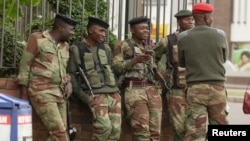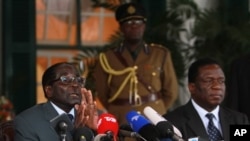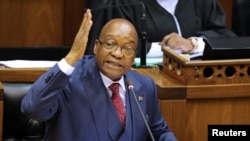Amid crisis in Zimbabwe's capital, there is also a flurry of activity in neighboring South Africa. The nation is home to a large Zimbabwean diaspora and in recent weeks, prominent figures who supported the military takeover have cycled through — signs that South Africa is a possible staging ground for what happens next in Zimbabwe.
The visitors have included Emmerson Mnangagwa — the man poised to be President Robert Mugabe’s successor — as well as Mugabe’s main political rival, the powerful head of the war veterans’ association and several other outspoken Mugabe opponents.
South African President Jacob Zuma also serves as chairman of the Southern African Development Community, which on Sunday will hold an extraordinary summit on Zimbabwe in Botswana’s capital.
Zimbabwean opposition politician Dumiso Dabengwa is a former intelligence chief who, by his own account, happened to be in South Africa this week, as the military sent tanks rolling down the streets of Harare and put Mugabe under house arrest. He says outsiders have failed Zimbabwe and need to stay out.
He says regional powers were too permissive in the wake of Zimbabwe’s flawed, violence-marred 2008 elections.
“The role of SADC after that, after setting up a roadmap for Zimbabwe, and failing to supervise, and then forcing the implementation of that roadmap, is what has led to all of this in Zimbabwe,” he told VOA.
Like many members of Zimbabwe’s opposition, he says the military’s actions do not constitute a coup, but rather, a “correction” to prevent Mugabe from anointing his unpopular wife, Grace Mugabe, as his successor at a ruling party conference in December. SADC and the African Union take a hard line on coups in member countries, suspending membership and imposing sanctions.
Mugabe’s actions earlier this month provided the spark for this flame, as he fired his vice president, Mnangagwa. That was widely seen as a step toward the installation of Mugabe's wife as vice president.
Dabengwa, who heads the opposition ZAPU party, says Mugabe is now trying to exploit the regional body to remain in power. In recent days, he has been clearly resisting pressure from military officials and negotiators to quietly step down.
“He wants to drag its feet, he wants to get SADC to leave things as they are, go to his ZANU-PF conference, where his wife becomes elected as a vice president,” he said.
Dabengwa, who said he has heard his name mentioned as a possible member of a post-Mugabe transitional government, did not say what might happen if Mugabe gets his way.
South Africa's government has long tried to distance itself from the appearance of interfering in its neighbor's affairs. Unlike other leaders in the region, no South African president has ever publicly called on Mugabe to step down.
Solomon “Sox” Chikowero of the Global Zimbabwe Forum in Johannesburg says many Zimbabweans would have liked South Africa to be more outspoken before things escalated to this point.
“It’s not that South Africa is afraid of Mugabe per se, but they’ve got their businesses that they want to protect in Zimbabwe, because once they say something bad about him, he will kick them out because he is one person who when he says, ‘I am going to kick you out,’ he will kick you out.”
Mugabe, who has ruled Zimbabwe since it gained independence in 1980, has become famous for sharp words like these. And he has made it clear that he sees only one path to leaving the presidency, saying last year, “As long as I am alive, I will head the country.”






